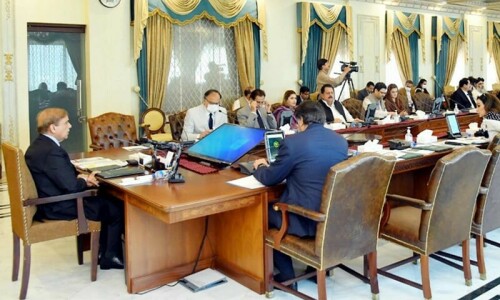THE planet remains in turmoil and global warming is on the ascendant. Stabilisation of the climate regime remains a major concern for the international community but conversations taking place on the need to accelerate commitments and reexamine financial architecture are lagging behind.
Despite 27 years of negotiations and the Paris Agreement of 2015, differences have increased and hostilities intensified. The party positions at the Bonn climate talks and the many disjointed attempts at financial reform are not reassuring signals for a reset.
This approach of duality with agreement on intent and laggard movement in action is very disturbing. Historic heatwaves, changes in weather patterns and disruptions in hydrologic regime are now sweeping the world. Once the process of destabilisation kicks in it will be difficult to control its dynamics.
The stock-take organised by the Ministry of Climate Change and Environmental Coordination on Aug 3 highlighted the challenges faced by the country.
With Prime Minister Shehbaz Sharif as the chief guest and attended by government officials, Senate and National Assembly members, parliamentarians, diplomats, civil society and media, the event provided the perfect platform for sharing Pakistan’s climate journey.
While the achievements and contributions of the ministry made in the short span of 15 months leave behind an impressive track record, the daunting challenges and multiple constraints with no imminent solution, are a matter of grave concern.
External finance alone won’t provide relief from climate change.
The Conference of Parties this year will take stock of the Nationally Determined Contributions and pitched battles on finance and financial architecture will be fought in Dubai.
The Loss and Damage Fund will also draw considerable attention. In the lead-up to COP28, many asks will need a push to gather support for building momentum.
With visible impacts of climate change accompanied by losses and fatalities, it is the right time to seek expansion of de-risking finance facilities controlled by multilateral development banks and greater incorporation of climate risks.
This is also the time to lobby for increasing the voices of developing countries in multilateral institutions more effectively.
The UNSG climate ambition summit in September will provide yet another opportunity for bridging distrust and using the multilateral platform to move towards concrete landing points.
Similarly, the IMF/World Bank annual meeting in October in Marrakech can be leveraged for discussions to convey a stance on ending fossil fuel financing and the need for aligning high-level policy to ensure fiscal space for climate investments, not austerity.
As we get closer to the red line of 2030 for emissions reduction, the tensions and competition for resources between the SDGs and Paris Agreement goals will also increase.
This time should be used for reiterating the individual nexus between climate, nature, and development goals with emphasis on adequate financing for both.
Pakistan’s recently launched National Adaptation Plan provides a vision strategy for strengthening resilience. The action plan will not be of much use without a timebound approach and access to finance.
It is time for the country to accept the home truth that reliance on external finance alone will not provide relief from climate change. The window for effective response is shrinking fast.
It is time to broaden our understanding of adaptation and use it as a step change to keep pace with new realities. This applies as much to managing the unsustainable increase in population to empowering women and exploring opportunities for regional social, economic and ecological integration.
Just as our national security policy has shifted its pivot from political to economic, we need to alter the way we look at climate change. Unfortunately, it is a subject that has not been embedded in public consciousness.
Experts deal with it technically, governments bureaucratically and electronic media with low emphasis.
Given the keen interest taken by people in politics, economics and food security, it should be used as the entry point for integrating climate into every conversation by linking it with the subject under discussion. Climate advocacy like climate diplomacy cannot be effective without sustained engagement.
We need to change but real change requires strong political leadership and a sharp focus on the reform agenda as part of the stock-take at home and at COP28. Inaction is not an option.
As the tenure of the present government comes to an end, it is important to highlight the need for the interim government to keep climate high on the agenda and provide strong leadership to carry the momentum built by Minister Sherry Rehman.
The writer is chief executive of the Civil Society Coalition for Climate Change.
Published in Dawn, August 5th, 2023













































Dear visitor, the comments section is undergoing an overhaul and will return soon.